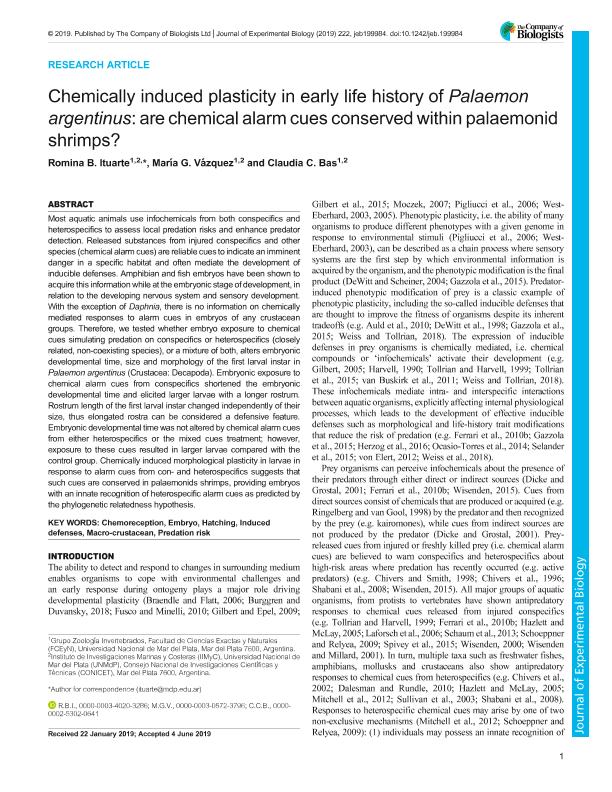Mostrar el registro sencillo del ítem
dc.contributor.author
Ituarte, Romina Belen

dc.contributor.author
Vázquez, María Guadalupe

dc.contributor.author
Bas, Claudia Cristina

dc.date.available
2021-01-12T17:30:54Z
dc.date.issued
2019-06
dc.identifier.citation
Ituarte, Romina Belen; Vázquez, María Guadalupe; Bas, Claudia Cristina; Chemically induced plasticity in early life history of Palaemon argentinus: Are chemical alarm cues conserved within palaemonid shrimps?; Company of Biologists; Journal of Experimental Biology; 222; 13; 6-2019; 1-8
dc.identifier.issn
0022-0949
dc.identifier.uri
http://hdl.handle.net/11336/122514
dc.description.abstract
Most aquatic animals use infochemicals from both conspecifics and heterospecifics to assess local predation risks and enhance predator detection. Released substances from injured conspecifics and other species (chemical alarm cues) are reliable cues to indicate an imminent danger in a specific habitat and often mediate the development of inducible defenses. Amphibian and fish embryos have been shown to acquire this information while at the embryonic stage of development, in relation to the developing nervous system and sensory development. With the exception of Daphnia, there is no information on chemically mediated responses to alarm cues in embryos of any crustacean groups. Therefore, we tested whether embryo exposure to chemical cues simulating predation on conspecifics or heterospecifics (closely related, non-coexisting species), or a mixture of both, alters embryonic developmental time, size and morphology of the first larval instar in Palaemon argentinus (Crustacea: Decapoda). Embryonic exposure to chemical alarm cues from conspecifics shortened the embryonic developmental time and elicited larger larvae with a longer rostrum. Rostrum length of the first larval instar changed independently of their size, thus elongated rostra can be considered a defensive feature. Embryonic developmental time was not altered by chemical alarm cues from either heterospecifics or the mixed cues treatment; however, exposure to these cues resulted in larger larvae compared with the control group. Chemically induced morphological plasticity in larvae in response to alarm cues from con- and heterospecifics suggests that such cues are conserved in palaemonids shrimps, providing embryos with an innate recognition of heterospecific alarm cues as predicted by the phylogenetic relatedness hypothesis.
dc.format
application/pdf
dc.language.iso
eng
dc.publisher
Company of Biologists

dc.rights
info:eu-repo/semantics/openAccess
dc.rights.uri
https://creativecommons.org/licenses/by-nc-sa/2.5/ar/
dc.subject
CHEMORECEPTION
dc.subject
EMBRYO
dc.subject
HATCHING
dc.subject
INDUCED DEFENCES
dc.subject
MACRO- CRUSTACEAN
dc.subject
PREDATION RISK
dc.subject.classification
Ecología

dc.subject.classification
Ciencias Biológicas

dc.subject.classification
CIENCIAS NATURALES Y EXACTAS

dc.title
Chemically induced plasticity in early life history of Palaemon argentinus: Are chemical alarm cues conserved within palaemonid shrimps?
dc.type
info:eu-repo/semantics/article
dc.type
info:ar-repo/semantics/artículo
dc.type
info:eu-repo/semantics/publishedVersion
dc.date.updated
2020-11-26T17:51:12Z
dc.journal.volume
222
dc.journal.number
13
dc.journal.pagination
1-8
dc.journal.pais
Reino Unido

dc.journal.ciudad
Cambridge
dc.description.fil
Fil: Ituarte, Romina Belen. Consejo Nacional de Investigaciones Científicas y Técnicas. Centro Científico Tecnológico Conicet - Mar del Plata. Instituto de Investigaciones Marinas y Costeras. Universidad Nacional de Mar del Plata. Facultad de Ciencias Exactas y Naturales. Instituto de Investigaciones Marinas y Costeras; Argentina
dc.description.fil
Fil: Vázquez, María Guadalupe. Consejo Nacional de Investigaciones Científicas y Técnicas. Centro Científico Tecnológico Conicet - Mar del Plata. Instituto de Investigaciones Marinas y Costeras. Universidad Nacional de Mar del Plata. Facultad de Ciencias Exactas y Naturales. Instituto de Investigaciones Marinas y Costeras; Argentina
dc.description.fil
Fil: Bas, Claudia Cristina. Consejo Nacional de Investigaciones Científicas y Técnicas. Centro Científico Tecnológico Conicet - Mar del Plata. Instituto de Investigaciones Marinas y Costeras. Universidad Nacional de Mar del Plata. Facultad de Ciencias Exactas y Naturales. Instituto de Investigaciones Marinas y Costeras; Argentina
dc.journal.title
Journal of Experimental Biology

dc.relation.alternativeid
info:eu-repo/semantics/altIdentifier/url/http://jeb.biologists.org/lookup/doi/10.1242/jeb.199984
dc.relation.alternativeid
info:eu-repo/semantics/altIdentifier/doi/http://dx.doi.org/10.1242/jeb.199984
Archivos asociados
